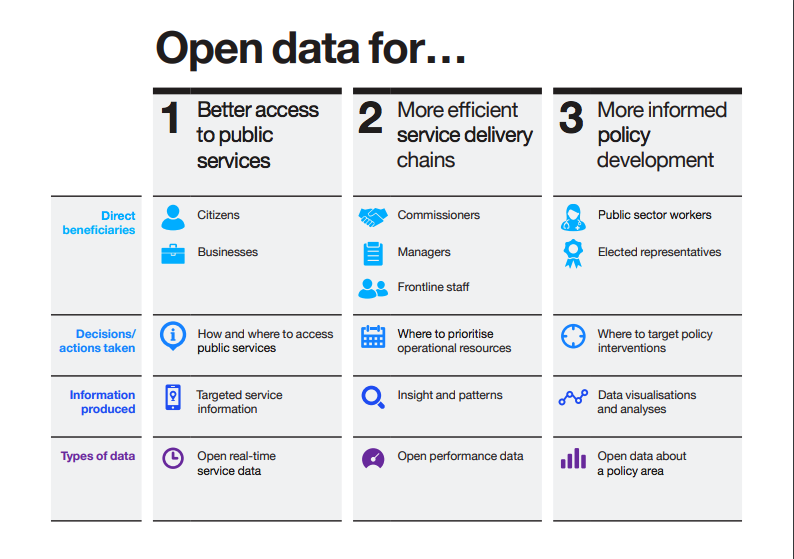
Build a data business case in local government
Making the business case for open data – and getting senior level buy-in – is a crucial point in your open data journey.
This tools aims to help those working in the design of public services to build a strong business case around three patterns of open data use.
Explore the tools
- You can either browse the relevant tools, grouped by aim and stage
- Or read our case studies which will lead you through a typical data business case journey, linking in relevant tools at each stage
Case studies: linking in business case-building tools
Through our research we have defined three high-level ‘patterns’ for how open data is used in public services.

These are: better access to public services – for citizens and businesses; more efficient service delivery chains – for commissioners, managers and frontline staff; and more informed policy development – for public sector workers and elected representatives.
We have linked a case study to each pattern below, to demonstrate how ODI and external tools can be used at different stages.
Better access to public services
Case study: The Great British Public Toilet Map
The Great British Public Toilet Map research project, by the Helen Hamlyn Centre for Design, worked with the 33 boroughs within Greater London to map out all public toilets in the region. Here we identify where tools (ODI and external) would be useful along that journey.
- Landscape scan: researchers assessed the current situation to identify what data was already available, and in what format
- Relevant tools:
- Data inventory guide: what is already out there?
- Ecosystem mapping: how does it all link together?
- Relevant tools:
- Getting buy-in from local councils: the research team identified challenges with local councils – in terms of funding and a lack of understanding about open data
- Relevant tools
- Procurement guide: how to embed open data into the procurement of public services
- Making open data work for you: case studies from the Local Government Association (LGA)
- Making an impact with data: LGA module looking at the impact of data use in local government
- Making transparency work for you: the benefits of publishing open data for local authorities
- Policy design patterns that help you use data to create impact
- Relevant tools
- Technical problems: the paper discusses the problem of councils using different dataset formats, issues with licensing, and lack of technical knowledge
- Relevant tools
- Collate data: the researchers gathered data directly by lobbying councils, and through a crowdsourcing campaign
- Relevant tools
- Open Standards for Data guide: use open standards when collating data
- Data Ethics Canvas: take into account ethical (and legal) considerations as you gather data
- Publisher’s guide to open data licensing: find out what it means to license data, and how it works
- Relevant tools
View the Great British Toilet Map here.
More efficient service delivery chains
- case study - urban intelligence from P3 report
Improving services through open data: Kent County Council
More informed policy development
Cabinet office release of government grants data: from P3 report
Use open data to explore the impact of closing fire stations in London
Tools
We produce free tools and guides to help you to manage, publish and use data. We also recommend external tools that can help with making the business case for open data.
Here we have listed the tools we think are most useful to local governments teams who are making the case for open data.
Tools to help to define your organisation's goals
These tools can help you explore your organisation's open data goals.
Procurement guide
This guide outlines why open data is useful for public services and explains how open data can best be embedded into the process of procuring them.
Data Readiness Planning Cards: tool to guide data use
The Data Readiness Planning tool is designed for those who collect, share and use data. It aims to address the challenge of managing increasing volumes of data in our highly connected, digital age. It covers key considerations when planning a data-informed project or policy, such as setting your overall strategy, prioritising your data sources and presentation, and reflecting on ethical and legal concerns around data usage.
Use the Data Readiness Planning tool
Tools to help with data use
These tools can help you explore how data is currently used, and how can it be better used.
Ecosystem mapping
Ecosystem mapping tool
Data inventory guide
Data inventory guide
Doncaster data cards
Doncaster data cards
Data Ethics Canvas
Data Ethics Canvas
Open Standards for Data guide
Standards guidebook
Use the Open Standards for Data guide
Using data to create impact: policy design patterns
Policy design patterns that help you use data to create impact
Read: Policy design patterns that help you use data to create impact
Tools to help demonstrate the value of open data
These tools can help you show the value of data for your organisation
Making open data work for you: Local Government Association tool
Prove the quality of your data publishing, and help build trust with your data reusers
Making an impact with data
Prove the quality of your data publishing, and help build trust with your data reusers
Making transparency work for you
Making transparency work for you
Making transparency work for you
Case studies for each pattern
Case studies for each pattern
Work with us
To find out more, collaborate or to set us a challenge contact [email protected].
You can also say hello on Twitter or explore our code on GitHub.